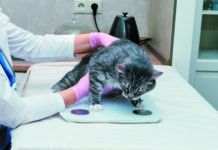Seven Research Grants
The Winn Feline Foundation recently announced new feline research grants funded in partnership with the George Sydney and Phyllis Redman Miller Trust.
“As the only foundation focused exclusively on feline medical research financial support, we are in a unique position to help advance the body of medical knowledge on the cat,” explained Winn President Glenn Olah, DVM, PhD, DABVP. “Through the Miller Trust, we are awarding $111,392 in grants for studies on safer imaging systems for respiratory distressed cats, treatment for a fatal tick borne blood parasite, improving the feline genome, a test for the silver coat color, effective chemotherapy for injection site sarcomas, phase two of evaluating a safer sedative/pre-anesthetic drug, and looking at differences in normal skin flora compared to allergic skin of cats.”
For more information, visit www.winnfelinefoundation.org.
Cats, Deer and toxoplasmosis
A study that was published in the journal EcoHealth has found that a large percentage of whitetail deer in the Cleveland, Ohio area are infected with a parasite associated with feral domestic cats.
“This study documents the widespread infection of deer populations in northeastern Ohio, most likely resulting from feral cats, and highlights the need for consumers of venison to make absolutely certain that any deer meat planned for consumption is thoroughly and properly cooked,” explained Gregory Ballash, a veterinary student of the Department of Veterinary Preventive Medicine at Ohio State University, and lead author of the study.
Two hundred free-roaming cats and roughly 450 deer were tested for the parasite Toxoplasma gondii, which causes toxoplasmosis. Almost 60 percent of the deer showed evidence of infection, and more than 65 percent of the studied cats tested positive.
According to the report, approximately 14 percent of the United States’ human population is infected with toxoplasmosis by the age of 40, with an estimated one million new cases diagnosed each year. Cats — both domestic and wild (such as bobcats) — play a critical role in the spread of toxoplasmosis because they serve as the definitive hosts.
Toxoplasmosis is a parasitic disease that is most commonly spread to humans through contact with the feces of household cats. This is why physicians strongly recommend that pregnant women do not clean litter boxes or eat undercooked meat products.



